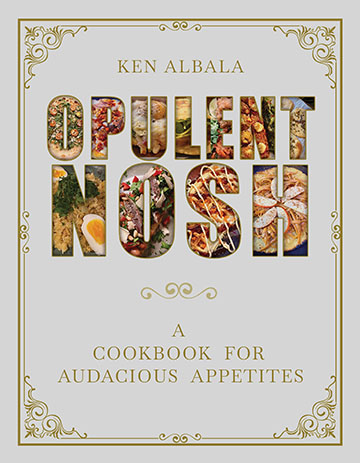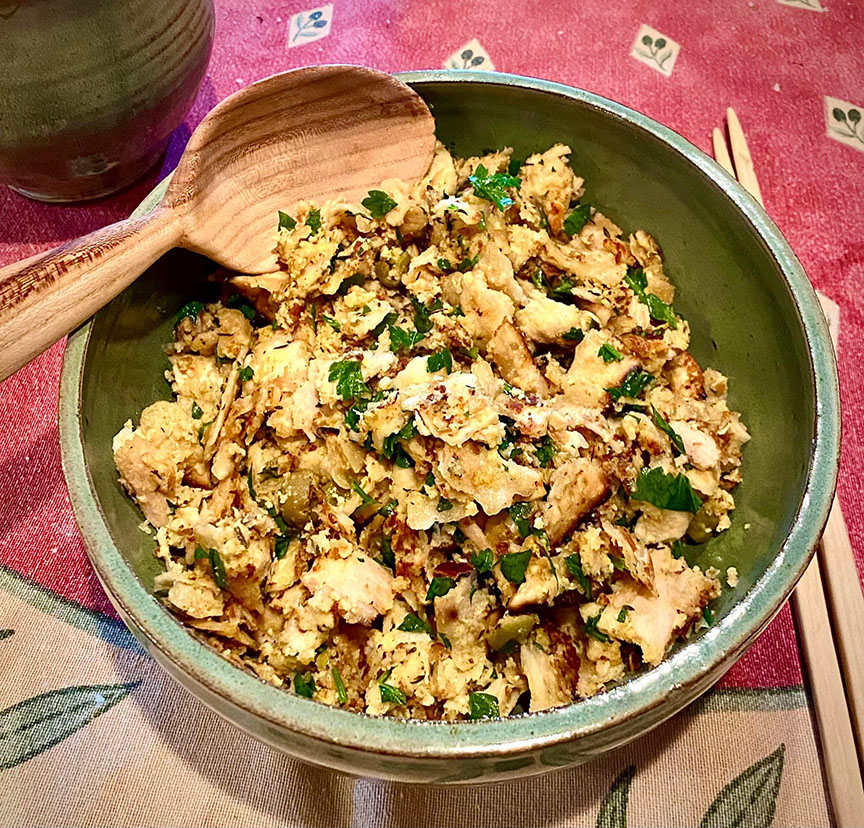
A professor of history at the University of the Pacific, Ken Albala’s books span from “Eating Right in the Renaissance” to “The Great Gelatin Revival: Savory Aspics, Jiggly Shots, and Outrageous Desserts.” His latest, “Opulent Nosh: A Cookbook for Audacious Appetites” is a one-of-a-kind cookbook of comfort food. Albala’s “Opulent Nosh” takes readers on a culinary journey with more than 100 recipes that transform simple dishes into memorable feasts.
 The book was written during the pandemic, when Albala was teaching online from home and was able to let his imagination run free in the kitchen. Food history is one of Albala’s courses. The big difference between this in his previous cookbooks was that he included precise instructions.
The book was written during the pandemic, when Albala was teaching online from home and was able to let his imagination run free in the kitchen. Food history is one of Albala’s courses. The big difference between this in his previous cookbooks was that he included precise instructions.
“Normally I don’t include measurements, cooking times or anything like that, because that’s the way people cooked in the past,” he said.
Also, “Opulent Nosh” began as a breakfast book
“I love breakfast because it’s the one meal I get to cook whatever I want and don’t have to cook for other people, which normally I do,” Albala told the Journal. “I can eat stranger things, I can play in the kitchen and, if I make something that doesn’t taste good, it doesn’t matter; I’ll eat the next day.”
Albala sent the breakfast version to a ha;f dozen agents, who called breakfast passe. “Everyone eats what they want for breakfast,” they told him.
Albala considered going the self-publishing route, but that didn’t work out either.
In the end, he wondered, “What would happen if I just changed breakfast–took that word out of the entire book–and put in nosh?”
“Most of the recipes are actually not conventional breakfast things; they’re things that people would snack on,” Albala said. “So I just took breakfast out, edited nosh, and tried again.”
A friend Albala worked with in publishing for many years, happened to work at the University of Alabama Press and just said, “We’ll do it.”
“They just got the spirit of the book perfectly,” Albala said. “What’s fun about this book is it’s very unconventional use of ingredients and techniques and things; this was really just my playing in the kitchen, trying to have fun, and things that came out that were just sometimes crazy.”
He added, “They’re not things that you’ll find anywhere on earth, because I invented them; some of them really were good, like surprisingly good.”
For instance, he was playing with green peas, and wondered, “What would happen if I ground these up and treated it like flour?” Albala said all you need is a strong food processor spice grinder.
“So I mixed it with eggs and baking soda and milk, just like you would use flour to make muffins or bagels,” he said. And it was great!
Albala’s mother’s side is Ashkenazi and his father’s side is Sephardic.
“My father’s mother was born in Smyrna or Izmir in Turkey, and my grandfather came from northern Greece,” he said “It’s a very different cuisine than you might imagine from most Jewish Americans.”
Albala said his love of food comes from the fact that his father was “obsessed” with food.
“His mother was a great cook, my mother was actually a terrible cook, so I kind of did it in revenge: I wanted to eat well,” he said. “My mother actually did make one thing: koukouroukou is what she called it, but it was like a twisted, braided cookie, and you often see them in Greek pastry shops now, but my mother’s were actually better.”
When asked about his absolute favorite breakfast, Albala said it’s noodle soup, something else he wrote a book on about five years ago.
“I try not to eat it every day because it is actually really fattening, and so I eat it every other day,” he said. “If I have time, I’ll still hand roll the noodles, use my own stock, cut up vegetables; it just takes time.”
Albala has also written historical cookbooks, books on fine dining and banqueting and a handful of books on individual ingredients, such as beans, pancakes and nuts. He has edited food books, including a series on food cultures around the world and a four volume encyclopedia.
“I’ve done a few of those big, big, big projects that are like a million words and 250 contributors and stuff like that,” he said. “I’m not doing that ever again, but it was fun and it meant that I got to know everyone in the field.”
Albala is currently working on an atlas of fermentation, as well as one on carving spoons, which is his latest thing. “I taught myself to do it, which is a load of fun,” he said
“One of the messages I’ve been trying to promote in most of my books is that cooking is inherently fun, that everyone should do it. as often as they can,” Albala said. “It’s one of those fundamental things about humanity that gives us pleasure, like making music or dancing or running around in circles, whatever you do to make you happy.”
Albala’s recipe for matzo brei is below. He made the wooden bowl and spoon in the picture.
Learn more about “Opulent Nosh,” follow @KenAlbala on Instagram and find his food groups on Facebook.
For the full conversation, listen to the podcast:
Matzo Brei

There are two ways to make this traditional Jewish dish: either as a solid leaden pancake or as light flaky nubbins saturated with egg. This is the latter, but fortified with a range of ingredients that on first sight seem incongruous, but meld into a remarkably satisfying combination.
It is anything but traditional, nor is it kosher. To make it kosher, just leave out the turkey.
1 ½ matzos
1 cup milk
Pinch of salt and pepper
2 eggs
1 tbsp capers
1 slice leftover turkey, shredded finely (optional)
1 tbsp whole grain mustard
10 leaves of fresh tarragon or other fresh herb
1 oz of cheese such as mozzarella, gruyere or havarti, shredded finely
1 tbsp butter
Break the matzah into small pieces in a bowl and cover with the milk. Allow to sit for a few minutes and then pour off any excess milk.
Add all the other ingredients. Fry gently in the butter, stirring constantly.
The cheese will at first stick to the pan, but don’t worry, it will eventually meld with the rest. You are looking for delicate pieces of matzo, just a little chewy, but not rubbery.
That will take maybe 10 minutes on low heat. You can add a few drops of maple syrup if you like, but it doesn’t need it.
Debra Eckerling is a writer for the Jewish Journal and the host of “Taste Buds with Deb.” Subscribe on YouTube or your favorite podcast platform. Email Debra: tastebuds@jewishjournal.com.






















 More news and opinions than at a Shabbat dinner, right in your inbox.
More news and opinions than at a Shabbat dinner, right in your inbox.